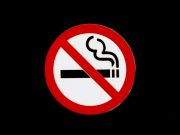The chemicals that leak from a cigarette butt could be toxic enough to kill 50% of the saltwater and freshwater fish exposed for 96 hours. This percentage was calculated by experiments in which butts were submerged in a litre of water for 24hours. Moreover, when ingested the hazardous chemicals in microplastics cause long-term mortality in marine life, including birds, fish, mammals, plants and reptiles.
Subsequently, these microplastics enter the food chain and are associated with serious human health impacts, leading to changes to genetics, brain development, respiration rates and more.
To this effect, UNEP and the Secretariat of the World Health Organisation Framework Convention on Tobacco Control (WHO FCTC) are launching a social media campaign with the aim of raising awareness about this issue.
UNEP’s Clean Seas campaign is a global coalition comprised of 63 countries devoted to ending marine plastic pollution. The campaign aims to combine the two agencies’ respective experience and resources to tackle this worldwide problem.
The campaign will refer to an EU directive requiring plastics’ labelling
The campaign will use social media platforms to engage influencers, as well as UNEP’s Goodwill Ambassadors and Young Champions of the Earth. It will include a political advocacy angle by highlighting a recent European Union directive that requires all tobacco products with plastic filters to be labelled clearly.
“The Secretariat of the WHO FCTC has the technical expertise of the impact of tobacco products on not just human health but also on environment,” said Atif Butt, UNEP’s Chief of Public Advocacy. “By joining UNEP’s and the Secretariat of the WHO FCTC’s expertise together under the Clean Seas activation on microplastics, we aim to highlight how our health is intrinsically linked to that of our planet,” he said.
Read Further: NewsVerge













